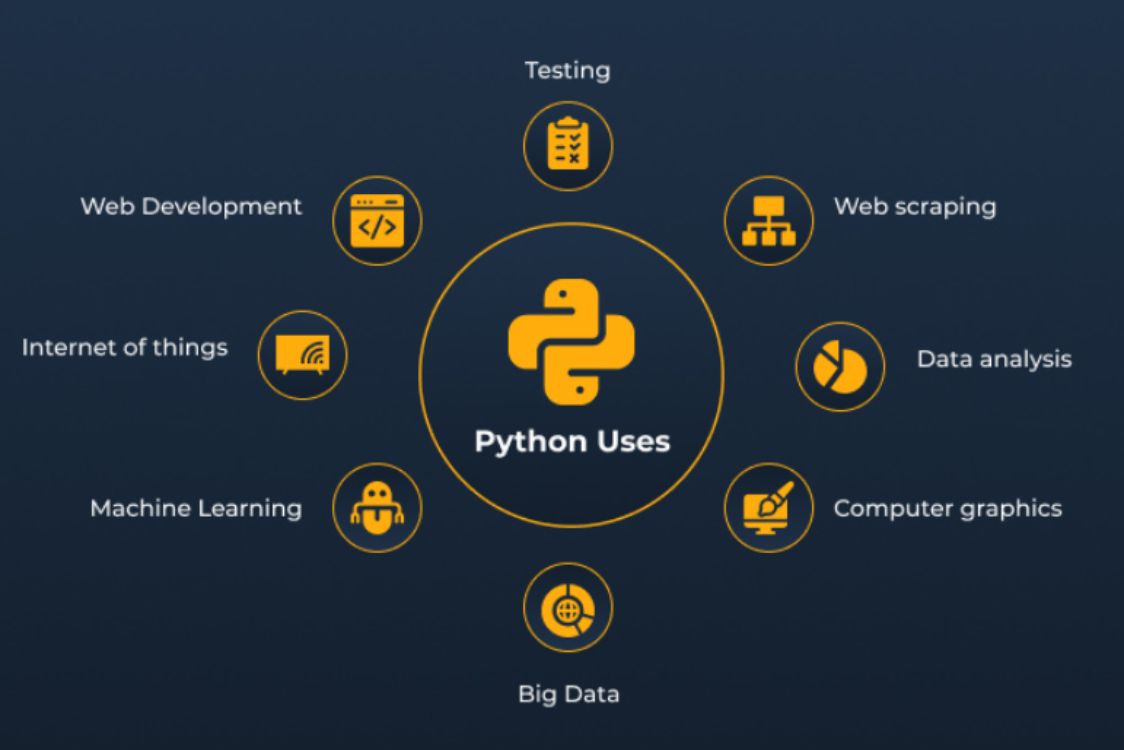In the ever-evolving landscape of web development, selecting the right Python backend framework is crucial for building scalable and efficient applications. With technology advancing rapidly, developers need to stay updated on the latest trends and tools. As we move through 2026, emerging advancements and upgrades are expanding possibilities for developers and enhancing overall capabilities. The choice of a backend framework can significantly impact the performance, security, and maintainability of a project, making it essential to choose wisely.
Smart Digitants has compiled a comprehensive list of the top 11 Python backend frameworks that developers should consider for their next project. This list not only highlights the most popular and widely-used frameworks but also delves into their unique features, benefits, and potential use cases. From lightweight mvc frameworks to full-featured solutions, these frameworks cater to diverse development needs and preferences. By evaluating these options, developers can make informed decisions that align with their project requirements and goals.
Whether you are building a simple web application or a complex enterprise solution, the right framework can streamline development processes, enhance productivity, and ensure a robust and scalable final product. The Python backend framework featured in Smart Digitants‘ list are known for their flexibility, performance, and community support, making them valuable assets in any developer’s toolkit.
- Django
Django remains one of the most widely used Python backend frameworks due to its comprehensive features and security. It follows the “batteries-included” philosophy, meaning it comes with a variety of built-in functionalities out of the box, such as authentication, ORM (Object-Relational Mapping), and an admin panel. Django’s robust nature makes it an excellent choice for building scalable and secure applications quickly.
Key Features:
- High-Level Security Measures: Django includes built-in protections against common security threats such as SQL injection, cross-site scripting (XSS), and cross-site request forgery (CSRF), making it a secure Python backend framework for web development.
- Scalability and Robustness: Django is designed to help developers take applications from concept to completion as fast as possible, while also ensuring that they can scale effectively as they grow.
- Flexible Architecture: Django supports both monolithic and microservices architectures, making it adaptable to evolving requirements.
- SEO-Optimized Design: Django’s URL design encourages the use of human-readable URLs, which are not only user-friendly but also contribute to better SEO rankings.
- Flask
Flask is a lightweight Python backend framework perfect for small to medium-sized applications. It offers flexibility and simplicity, making it a favorite among developers who prefer minimalism over complexity. Unlike Django, Flask does not come with built-in tools and libraries, giving developers the freedom to choose their own components.
Key Features:
- Micro-Framework with Extensibility: Flask’s minimalistic approach allows developers to extend its capabilities using a wide range of extensions available in the Flask ecosystem.
- Jinja2 Templating Support: Flask uses Jinja2 as its templating engine, enabling developers to create dynamic and customizable HTML templates easily.
- Strong Community Support: A wide variety of extensions are available to enhance functionality.
- Easy Integration with Third-Party Libraries: Flask can be easily integrated with various third-party libraries and tools, allowing developers to add functionalities as needed without being restricted by a rigid framework structure.
- FastAPI
FastAPI has gained popularity due to its exceptional speed and support for asynchronous programming. It is one of the fastest Python backend frameworks available, making it ideal for building real-time applications and services that require high performance and responsiveness.
Key Features:
- Asynchronous Request Handling: FastAPI’s support for asynchronous programming allows it to handle multiple requests simultaneously, resulting in faster and more efficient applications.
- Automatic Data Validation: FastAPI automatically validates data using Python type hints, reducing the need for manual validation and ensuring data integrity.
- Built-in Support for OpenAPI: FastAPI generates interactive API documentation using OpenAPI, making it easier for developers to test and debug their APIs.
- Tornado
Tornado is known for its ability to handle thousands of simultaneous connections, making it an excellent choice for applications requiring real-time updates and high concurrency. It is designed to be highly efficient and can manage long-lived network connections.
Key Features:
- Non-Blocking Network I/O: Tornado’s non-blocking I/O model allows it to handle numerous connections concurrently without being blocked by slow network operations.
- WebSockets Support: Tornado provides built-in support for WebSockets, enabling real-time communication between clients and servers, which is essential for applications like chat services and live updates.
- High Concurrency Handling: Tornado’s architecture is optimized for handling high concurrency, making it suitable for applications with a large number of active users.
- Pyramid
Pyramid is a highly adaptable Python backend framework suitable for both small and large applications. It follows the principle of “start small and scale big,” allowing developers to create simple applications initially and gradually add complexity as needed.
Key Features:
- Flexible Authentication and Authorization: Pyramid provides a flexible and extensible system for managing authentication and authorization, allowing developers to implement custom security policies.
- Customizable Routing System: Pyramid offers a powerful and customizable routing system that enables developers to define complex URL patterns and route requests to appropriate views.
- Efficient Debugging Tools: Pyramid comes with efficient debugging tools that help developers identify and resolve issues quickly, ensuring smooth development and maintenance.
- CherryPy
CherryPy allows developers to build web applications that function similarly to native Python applications. It is known for its simplicity and flexibility, making it a great choice for developers who prefer direct control over their projects without the complexities of larger frameworks. CherryPy’s minimalist approach ensures that developers can focus on writing clean and efficient code while still benefiting from essential web development features.
Key Features:
- Minimalistic and Lightweight: CherryPy a Python backend framework is designed to be minimalistic, providing only the essential tools needed for web development, making it lightweight and easy to use.
- Built-In HTTP Server: CherryPy includes its own multi-threaded HTTP server, allowing developers to run web applications without needing to configure an external server.
- WSGI-Compliant Framework: CherryPy is fully WSGI-compliant, ensuring compatibility with other WSGI applications and middleware, making it a versatile choice for various web development projects.
- Falcon
Falcon is an API-focused Python backend framework known for its high performance and clean design, making it ideal for building robust microservices and high-performance APIs. Its lightweight nature and low overhead enable developers to create fast and efficient applications that can handle a large number of requests with minimal latency.
Key Features:
- Optimized for High-Speed API Development: Falcon a Python backend framework is specifically designed for API development, offering a streamlined and efficient workflow for creating fast and reliable APIs.
- Lightweight and Modular: Falcon’s modular architecture allows developers to include only the components they need, keeping the framework lightweight and efficient.
- Low Overhead with Minimal Dependencies: Falcon minimizes dependencies and overhead, ensuring that applications built with Falcon remain lean and perform well under high load conditions.
- Bottle
Bottle is one of the simplest Python backend frameworks, designed to be fast and lightweight. It is particularly suitable for small web applications, prototyping, and educational purposes. Bottle’s simplicity and single-file deployment make it an excellent choice for developers looking for a quick and easy way to create web applications without the need for complex configurations.
Key Features:
- Single-File Deployment: Bottle allows developers to create and deploy entire web applications in a single file, simplifying the development process and reducing complexity.
- Built-In HTTP Development Server: Bottle includes a built-in HTTP development server, allowing developers to run and test their applications locally without needing additional server software.
- Minimal Dependencies: Bottle has very few dependencies, making it easy to install and use, and ensuring that applications remain lightweight and easy to maintain.
- Hug
Hug is another Python backend framework API-first framework that prioritizes efficiency and usability. It is designed to make developing and consuming APIs as straightforward as possible, providing seamless support for both synchronous and asynchronous operations. Hug’s focus on performance and ease of use makes it an excellent choice for modern applications that require fast and efficient API communication.
Key Features:
- High Performance with Minimal Code: Hug emphasizes performance and simplicity, allowing developers to create high-performance APIs with minimal code and effort.
- In-Built Support for Versioning: Hug includes built-in support for versioning, enabling developers to manage different versions of their APIs easily and ensure backward compatibility.
- Support for Synchronous and Asynchronous Requests: Hug provides seamless support for both synchronous and asynchronous request handling, making it flexible and adaptable to various use cases.
- Sanic
Sanic, also a Python backend framework, is designed to be fast and asynchronous, leveraging Python’s async capabilities to deliver high-speed performance. It is built to handle large volumes of requests efficiently, making it an ideal choice for real-time applications and services that require quick response times and high concurrency.
Key Features:
- Non-Blocking Architecture: Sanic’s non-blocking architecture allows it to handle multiple requests concurrently without being blocked by slow operations, ensuring fast and responsive applications.
- WebSockets Support: Sanic includes built-in support for WebSockets, enabling real-time communication between clients and servers, which is essential for applications like chat services and live updates.
- Built-In Request Validation: Sanic provides built-in request validation, ensuring that incoming data is checked and validated before processing, improving security and data integrity.
- Masonite
Masonite is an emerging Python backend framework that offers a developer-friendly environment with built-in tools for rapid application development. It combines modern architecture with a focus on simplicity and ease of use, providing developers with a powerful and intuitive framework for building web applications quickly and efficiently.
Key Features:
- Modern Architecture with Service Providers: Masonite’s modern architecture, based on service providers, allows for clean and modular code, making it easy to manage and extend applications.
- Support for ORM, Queues, and WebSockets: Masonite includes built-in support for ORM (Object-Relational Mapping), task queues, and WebSockets, providing developers with all the tools needed for full-featured web applications.
- Simple Configuration and Setup: Masonite’s simple configuration and setup process enable developers to get started quickly and focus on writing code rather than dealing with complex configurations.
Python Backend Framework FAQs
Which Python backend framework is best for large-scale applications?
Django remains a strong choice for large-scale projects due to its scalability, security, and mature ecosystem.
Is Flask suitable for enterprise applications?
While Flask is lightweight, it can be used for enterprise applications with the right extensions and configurations. Its flexibility allows for customization and optimisation to meet enterprise needs.
Why should I choose FastAPI over Flask?
FastAPI offers asynchronous support and higher performance, making it ideal for real-time applications. Its automatic data validation and interactive API documentation provide a more efficient experience compared to Flask.
How does Pyramid compare to Django?
Pyramid is more flexible and minimalistic, allowing for customised solutions. Django, on the other hand, offers a more structured and feature-rich environment with built-in functionalities for rapid development.
Take Your Web Development to the Next Level with Smart Digitants
Choosing the right Python backend framework is essential for developing high-performance applications. Whether you prefer a full-stack framework like Django or a micro-framework like Flask, there is a solution for every requirement. If you need expert guidance, Smart Digitants can help you select and implement the best framework for your project.
Contact Smart Digitants today to get started!
Our Content Writing Team at Smart Digitants is a group of dedicated professionals, passionate about creating high-quality, engaging content.










